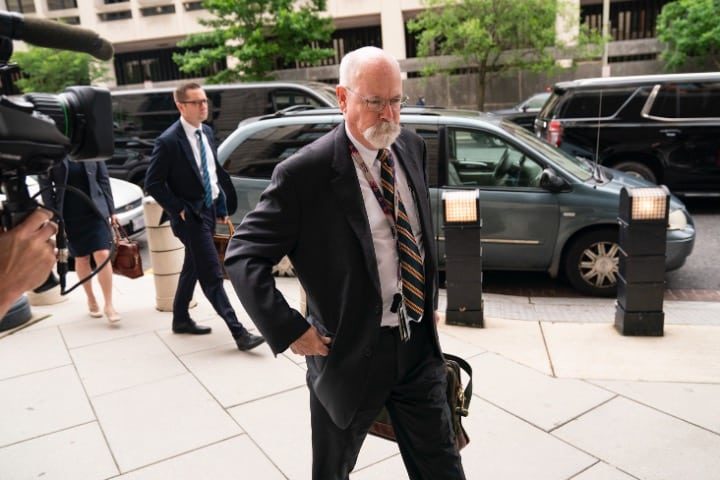
After 3 1/2 years of investigations, special counsel John Durham released his report this week detailing the political use of supposedly nonpartisan agencies of the United States government, including the Federal Bureau of Investigation (FBI) and other intelligence agencies, such as the Central Intelligence Agency (CIA), but promised no criminal prosecutions as a result. In other words, the criminal justice apparatus and intelligence community of the U.S. government were weaponized to favor one political party over another political party, greatly altering the outcomes of both the 2018 midterm congressional elections and the 2020 presidential election, yet no one is being held criminally accountable for it.
And those of the left-wing political persuasion in the media who cheered on the false accusations against former President Donald Trump that he was in collusion with Russian President Vladimir Putin to “steal” the 2016 election are understandably elated over that. For example, Steve Benen of MSNBC wrote, “Durham was tasked with uncovering criminal misconduct, and he just didn’t find anything.”
It is almost as though the left-leaning mainstream media get a memo on what to say about major political stories. The New York Times, for example, headlined their online story thusly: “After Years of Political Hype, the Durham Inquiry Failed to Deliver.” Compare that to Rachel Maddow’s report, which was headlined that Durham “failed to deliver” on hype.
This echo chamber in the leftist media is typical, and it understandably leads to frustrating reactions from some in the Republican Party, such as this from Senator Tommy Tuberville of Alabama: “If people don’t go to jail for this, the American people should just stand up and say, ‘Listen, enough is enough, let’s don’t have elections anymore.’”
Of course, it is doubtful that Tuberville is serious about not having elections anymore, but there are millions of Americans who share his frustration at the double standard of justice that now exists in the country.
So why did Durham not pursue criminal charges with the conclusion of his investigation? Politico wrote, “Durham brought criminal charges against just three people [earlier in his investigations]. He lost both cases that went to trial. In a third case, an ex-FBI lawyer named Kevin Clinesmith pleaded guilty to altering an email that was used to support a surveillance application.” He received no jail time.
Durham, in his report, offered an explanation for not pursuing any criminal charges against those in our own government who were attempting to incarcerate their political opponents, using the power of federal criminal justice and intelligence agencies to do it. “Conducting this investigation required us to consider U.S. criminal laws, the Constitutional protections our system provides to individuals, and the high burden placed on the government to prove every element of a crime ‘beyond a reasonable doubt.’”
In addition to this requirement, Durham added, “There are also reasons why, in examining politically-charged and high-profile issues such as these, the Office must exercise — and has exercised — special care. First, juries can bring strongly held views to the courtroom in criminal trials involving political subject matters, and these views can, in turn, affect the likelihood of obtaining a conviction, separate and apart from the strength of the actual evidence and despite a court’s best efforts to empanel a fair and impartial jury.” (Emphasis added.)
Bluntly put, Durham is alluding to the fact that any trials resulting from his prosecution would take place in the District of Columbia, where Democrats regularly win by margins far exceeding 90 percent of the vote. (Even in 1984, when Republican Ronald Reagan was carrying 49 states, his opponent Walter Mondale received almost 90 percent of the vote in D.C.) Durham has already experienced such political bias in losing two cases that he brought to trial in D.C. In one of his cases, the jury foreman essentially said that the case was a waste of time.
While Durham did not say so directly, this is a serious problem. As the District of Columbia is the seat of government for the United States (the Constitution of the United States does not refer to such district as the capital of the United States), cases involving these problems will fall under the jurisdiction of federal courts within the federal district. One party — the party that favors more and more governmental power — having such political dominance in such a district is clearly unfair to minority-party individuals in that district. As Durham said, “juries can bring strongly held views to the courtroom in criminal trials involving political subject matters.” One’s chances of being found guilty by such a jury, if one opposes increased governmental power, are greatly increased, while an individual in the FBI or CIA who committed a crime against a political figure unpopular in the district — such as Donald Trump — is almost certainly going to be found not guilty.
At the Constitutional Convention, George Mason of Virginia specifically opposed that the “seat of the general government” be within the borders of a state. And, while the District of Columbia is still not a state, and does not elect voting members of Congress, it operates for most purposes as a state. In fact, its courts apparently have more clout than the courts of any of the 50 states. Its residents get to vote for the president of the United States and choose three presidential electors.
We have just such a situation that the Framers of the Constitution hoped to avoid — the seat of government for the federal (or “general”) government is now within the borders of a district that is almost a state. Some even want it to become a state, officially, knowing that it would give their party two more U.S. senators.
The solution to this problem is to close the courts found inside the District of Columbia (except for the U.S. Supreme Court) and farm out such cases involving political figures to courts outside of the district. This could be done on a random basis, in much the same way that many local district courts randomize cases heard by judges. No one can argue that the Framers of the Constitution intended the travesty of justice that we now experience due to this problem.
Congress can create and abolish any federal court, except for the Supreme Court. They should do so with federal courts in the District of Columbia, as soon as possible.


